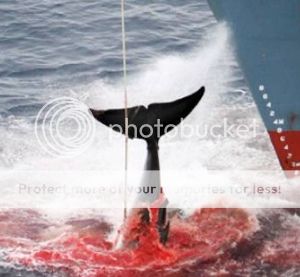The Need for Whales is Elementary My Dear Watson

With conservationist Paul Watson fighting for his freedom and right to defend defenseless whales from human slaughter, it is little in the way of a surprise that aggressive whaling practices in Iceland, Japan, and the Faroe Islands have reemerged.
The word the brain searches for is hypocrisy. Webster's Dictionary defines hypocrisy as "the practice of claiming to have moral standards or beliefs to which one's own behavior does not conform." In other words, it is the condition where people say one thing, but do another. Governments are a collective of individual people with the purpose of working towards common goals. One of those purported common goals, at least publicly, is the preservation of endangered species, of which just about every known whale species is thusly classified. Tax paying citizens around the world pay their governments tens of billions of dollars annually to enact and uphold endangered species laws. Yet, law-abiding conservationists face the constant threat of going to prison, while whalers, who slaughter these endangered species under the guise of research, remain untouched. People really need to stop and think about how the lives of whales are used as global chits.
The issues of conservation and law enforcement go far beyond the surface understanding of "save the whales." At the center of whale preservation is the rarely discussed matter of how whales are vital to the stability of Earth's water system. Therefore, whaling is not only breaking endangered species laws, but also violating a number of environmental acts, as well. Responsible members of proactive and productive organizations, such as the Sea Shepherd Conservation Society, understand the urgency for global awareness towards a stable whale population.
The proliferation of krill can be likened to that of land bound insect populations, without nature's checks and balances in place; it tips the ecosystem on its side. The Blue Whale alone, consumes in excess of 40 million krill each day. Whale excrement is vital for the proliferation of phytoplankton, literally the building blocks for all aquatic life. Additionally, phytoplankton helps pull excess carbon from the air. Therefore, whales naturally regulate aquatic life, while systematically restarting the food chain cycle, and providing land bound animals with fresh air. To put this into selfish terms, people need whales to exist so that they might enjoy the same privilege. Since the inception of the Industrial Era, most people engage the act of living like it is a weekend barbeque, with little regard for over consumption and exponential pollution generation. This behavior surpasses primal "monkey on the mountain behavior," as at least primates have the forethought not to cull other species to the point of extinction, simply by exercising the common sense need to save their own kind.
The Recap
For those interested, sign the Stop Illegal Whaling Practices. Those seeking the opportunity to volunteer should strongly consider exploring the Sea Shepherd Conservation Society.
This is Deb Duxbury, for Animal Life, reminding you to please spay or neuter your pet.
The word the brain searches for is hypocrisy. Webster's Dictionary defines hypocrisy as "the practice of claiming to have moral standards or beliefs to which one's own behavior does not conform." In other words, it is the condition where people say one thing, but do another. Governments are a collective of individual people with the purpose of working towards common goals. One of those purported common goals, at least publicly, is the preservation of endangered species, of which just about every known whale species is thusly classified. Tax paying citizens around the world pay their governments tens of billions of dollars annually to enact and uphold endangered species laws. Yet, law-abiding conservationists face the constant threat of going to prison, while whalers, who slaughter these endangered species under the guise of research, remain untouched. People really need to stop and think about how the lives of whales are used as global chits.
The issues of conservation and law enforcement go far beyond the surface understanding of "save the whales." At the center of whale preservation is the rarely discussed matter of how whales are vital to the stability of Earth's water system. Therefore, whaling is not only breaking endangered species laws, but also violating a number of environmental acts, as well. Responsible members of proactive and productive organizations, such as the Sea Shepherd Conservation Society, understand the urgency for global awareness towards a stable whale population.
The proliferation of krill can be likened to that of land bound insect populations, without nature's checks and balances in place; it tips the ecosystem on its side. The Blue Whale alone, consumes in excess of 40 million krill each day. Whale excrement is vital for the proliferation of phytoplankton, literally the building blocks for all aquatic life. Additionally, phytoplankton helps pull excess carbon from the air. Therefore, whales naturally regulate aquatic life, while systematically restarting the food chain cycle, and providing land bound animals with fresh air. To put this into selfish terms, people need whales to exist so that they might enjoy the same privilege. Since the inception of the Industrial Era, most people engage the act of living like it is a weekend barbeque, with little regard for over consumption and exponential pollution generation. This behavior surpasses primal "monkey on the mountain behavior," as at least primates have the forethought not to cull other species to the point of extinction, simply by exercising the common sense need to save their own kind.
The Recap
- Taxpayers spend an inordinate amount of money so their respective governments will draft and uphold endangered species and environmental laws, with nothing to show for it other than increased taxes. What do they do with all that money?
- Responsible conservationists are people attempting to hold lawbreakers accountable to existing laws. For their efforts, they are arrested and incarcerated, while the actual criminals continue their illegal pillaging of global waters without fear of repercussion or government interference. In other words, they are pirates with the backing and the blessing of governments, for a percentage.
- Most whale populations have dropped since the inception of endangered species and environmental acts. This suggests that such acts are used as nothing more than governmental leverage to secure financial incentives, and have little to do with providing protection or stability. It should be unreasonable for any country, engaging in piracy, to demand legal retribution against those abiding the principles of animal and environmental laws. Of course, there is the claim that these countries responsibly engage in periodic cessations. However, the infrequent donning of the window dressing, which creates the illusion of a "whaling hiatus," is ineffective. These pauses in whaling do not usually surpass two years. For most whale species, the females only attempt mating every three years, and gestation takes at least 12 months. The use of fundamental math points out that a two-year lull in culling does nothing for positive population growth.
- Humans are the only predator of living whales. In addition to arbitrarily hunting them, we accelerate their deaths by blasting sonar, and filling the oceans with non-biodegrading carcinogenic plastics and caustic chemicals. Essentially, humans have engaged a full-scale attack on legally protected whale species, which do nothing more than keep water sources stable and vibrant for our continued use.
For those interested, sign the Stop Illegal Whaling Practices. Those seeking the opportunity to volunteer should strongly consider exploring the Sea Shepherd Conservation Society.
This is Deb Duxbury, for Animal Life, reminding you to please spay or neuter your pet.
You Should Also Read:
Heavy Whaling on Faroe Islands
Whaling in Iceland
NRDC Says Stop Breaking the Law!

Related Articles
Editor's Picks Articles
Top Ten Articles
Previous Features
Site Map
Follow @WildlifeWelfare
Tweet
Content copyright © 2023 by Deb Duxbury. All rights reserved.
This content was written by Deb Duxbury. If you wish to use this content in any manner, you need written permission. Contact Deb Duxbury for details.







